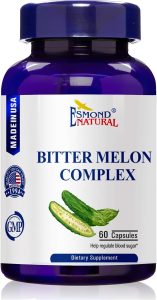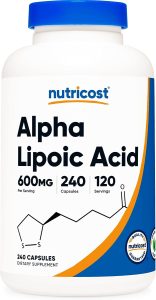Why The Heck is Ozempic The Latest Weight Loss Go-To Product?
Ok, so I’ve been hearing just about everyone talking about Ozempic. And although I obviously don’t need to lose weight myself, it piqued my interest. After all, my blog is about reviewing supplements. So I did my research on the subject of Ozempic and how it works to control blood sugar (its primary use) and how Ozempic aids in weight loss.
What is Ozempic?
Ozempic, also known by its generic name semaglutide, is a prescription medication primarily used for the management of type 2 diabetes. It belongs to a class of drugs known as GLP-1 receptor agonists.

How Ozempic Works
Ozempic works by mimicking the effects of the hormone GLP-1 (glucagon-like peptide-1), which is involved in blood sugar regulation.
GLP-1 is found in the intestine and is released naturally in response to food intake. GLP-1 stimulates insulin production when blood sugar levels are high.
The higher levels of insulin inhibit the release of glucagon (the hormone that raises blood sugar levels). These actions help to lower and stabilize blood sugar levels in people with type 2 diabetes.
Ozempic suppresses the release of glucagon from the pancreas. Glucagon is a hormone formed in the pancreas. It promotes the breakdown of glycogen to glucose in the liver and leads to an increase in blood sugar levels.
Ozempic and Weight Loss
Ozempic has gained attention for its effects on weight loss. While it is not primarily a weight-loss medication, one of its side effects is reduced appetite, which can lead to weight loss. This effect is due to its action of slowing gastric emptying, making individuals feel fuller for longer periods.
It’s important to note that any weight loss strategy with Ozempic should be part of a broader plan involving diet and exercise, and should be supervised by a healthcare provider.
Ozempic is typically administered as a once-weekly injection.

The Downside of Ozempic
1. Gastrointestinal Issues
Gastrointestinal problems are by far the most common complaints that I have encountered from people who have tried Ozempic. This is quickly followed by the comment that the weight loss benefits greatly outweigh the side effects.
The stomach side effects may include nausea, vomiting, diarrhea, constipation, and abdominal pain. These effects are more common at the start of the treatment and usually subside as the user adjusts to the medication.
2. Hypoglycemia
This applies mostly to diabetics who are on a diabetic regimen. Since Ozempic is typically used in combination with other diabetic medications that already act to lower blood sugar levels (these include medications such as insulin and sulfonylureas), the risk of low blood sugar levels or hypoglycemia can be a serious complication. Symptoms of hypoglycemia include sweating, dizziness, confusion, shakiness, and hunger.
3. Injection Site Reaction
It is not uncommon for an individual to experience redness, itching, or irritation at the injection site. Therefore, it is extremely important to follow administration instructions and rotate the injection site to decrease these reactions.
4. Gallbladder Issues
Although rarely reported as an adverse effect, Ozempic may increase the risk of gallbladder-related problems; these include gallstones and inflammation of the gallbladder. Symptoms include severe abdominal pain, nausea and vomiting. If you experience severe abdominal pain, seek medical help immediately.
5. Pancreatitis
Pancreatitis (inflammation of the pancreas) has also been associated with Ozempic use, although it is also a rare occurrence. Symptoms are similar to those of gallbladder issues and include severe abdominal pain that may radiate to the back. Nausea and vomiting are also reported with pancreatitis. As with all adverse symptoms, seek immediate medical attention.
Loss of Facial Fat
This was a new term for me: “Ozempic Face.” I have seen it before in extreme weight loss cases where the loss of fat is most noticeable in the face.
Fat provides padding and support for the skin, and when you lose weight rapidly, as has been reported with Ozempic use, the skin sags as the fat is no longer there to provide support.
In addition, the skin loses its collagen and elasticity and is unable to retract.
Ozempic users report the following:
– Increased lines and wrinkles
– A hollowed-out facial appearance
Given the success rate of weight loss purported by Ozempic users, it is only natural that people will seek out alternatives to the drug, mainly because it is only available by prescription and also because some of it’s side effects are not well tolerated by many individuals.
Natural Supplement Alternatives to Ozempic
Weight Loss and Blood Sugar Control Alternatives For Ozempic
Some studies suggest that cinnamon may help lower blood sugar levels and improve insulin sensitivity.
It is important to use genuine cinnamon, such as Ceylon Cinnamon, rather than cassia cinnamon, which is the variety found in grocery stores
Apple cider vinegar may help improve insulin sensitivity and lower blood sugar responses after meals.
This compound, found in several plants, has been shown to help lower blood sugar levels and may aid in weight loss.
Berbine is gaining popularity on social media and is being hailed as “nature’s Ozempic.”
Berberine is found in several plants, including goldenseal and barberry. It has been shown to have a positive impact on blood sugar control by improving insulin sensitivity and reducing glucose production in the liver.
Users have also reported decreased cravings for sugar and junk food when using Berbine.
Blood Sugar Control:
- Insulin-Like Effects: Bitter melon contains compounds that act similarly to insulin, which helps to lower blood sugar levels by increasing the uptake of glucose into cells. This insulin-like action is primarily due to compounds like charantin, vicine, and polypeptide-p.
Weight Loss:
- Appetite Suppression: Bitter melon can stimulate the satiety center in the brain, which may help in reducing appetite and avoiding overeating.
- Fat Reduction: Some studies suggest that bitter melon can play a role in reducing the accumulation of body fat. This might be due to its role in altering fat metabolism processes.
- Blood Sugar Control: Chromium is believed to enhance the action of insulin, a hormone critical to the metabolism and storage of carbohydrates, fats, and proteins in the body. Chromium supplementation has been studied for its potential in improving insulin sensitivity and reducing blood sugar levels in people with type 2 diabetes or insulin resistance.
- Weight Loss: There is some evidence suggesting that chromium might help reduce body weight and body fat, possibly by influencing the regulation of appetite and cravings. However, the effects are generally modest, and more research is needed to fully understand its role in weight management.
- Blood Sugar Control: This herb, commonly used in Ayurvedic medicine, is known for its anti-diabetic properties. Gymnema Sylvestre can contribute to the reduction of blood sugar levels by increasing insulin production and regeneration of insulin-secreting islet cells. Additionally, it may help decrease the absorption of sugar from the intestines.
- Weight Loss: The herb may aid in weight loss efforts as it can reduce sugar cravings and thus potentially decrease sugar intake. By blocking the sugar receptors on your taste buds, it might also reduce the appeal of sweet foods.
- Blood Sugar Control: ALA is a naturally occurring compound that acts as a powerful antioxidant in the body. It’s been studied for its ability to improve insulin sensitivity and reduce blood sugar levels in people with type 2 diabetes. ALA may also help reduce the symptoms of peripheral neuropathy, a common complication of diabetes.
- Weight Loss: While ALA is not primarily used for weight loss, some studies suggest it might help in this regard. This effect is thought to be due to its role in energy metabolism, although the evidence is not as strong or consistent as for its impact on blood sugar control.
**Medical Disclaimer:**
The information provided about these weight-loss supplements mentioned in this article is for general informational purposes only. It is not intended as a substitute for professional medical advice, diagnosis, or treatment. Always seek the advice of your physician or other qualified healthcare provider with any questions you may have regarding a medical condition. Never disregard professional medical advice or delay in seeking it because of something you have read about this weight loss supplement.
The use of these weight-loss supplements should be done according to the directions provided by the manufacturer and under the supervision of a healthcare professional. Do not exceed the recommended dosage. Individual results may vary.
If you have or suspect that you have a medical problem, promptly contact your healthcare provider.
**Affiliate Disclaimer:**
Some of the links on this website are affiliate links. This means that if you click on the link and make a purchase, we may receive a commission. This commission comes at no additional cost to you. We only recommend products or services that we believe will add value to our readers.
It is important to note that our editorial content is not influenced by affiliate partnerships. We are committed to providing honest and unbiased information to our readers.
Your support through purchasing products via affiliate links is greatly appreciated and helps us to continue providing valuable content.














